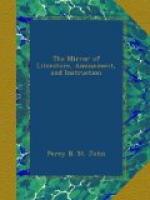* * * * *
ANECDOTE GALLERY.
SATIN STONE NECKLACES.
These beautiful ornaments of polished fluorspar—first made and brought into fashion, we believe, by the late Mr. Mawe, of the Strand—are even more appreciated by our Gallic neighbours than by ourselves. We have been in society where the attention and admiration of a gallant French gentleman was ludicrously divided between the attractions of a lady’s face and her satin-stone necklace. Some years since, the Duchess de Berri, it is said, purchased various ornaments of this description and material, to a considerable amount, which she wore, either upon, or immediately subsequent to, her marriage. On the fatal night of the Duke de Berri’s assassination, the Duchess happened (so goes the story) to be wearing one of these identical purchases; and, in consequence, upon the anniversary of her widowhood, and on other occasions when peculiarly depressed in spirits, never fails to put on a satin-stone necklace, as a memento of the hours of her bridal and deprivation. Louis XVIII. purchased, when in England, a large stock of these delicate, white necklaces, which, on returning to France, he disposed off amongst his admiring fair noblesse, by gift or purchase.
* * * * *
DUELLING IN FRANCE.
Different versions of the following anecdotes, respecting Mr. G—— (an English officer), may be abroad, but we give them as detailed to us:—
Mr. G——, a young English militaire of fashion and spirit, not a great while since, had the fortune to fight a couple of duels in Paris, under circumstances rather curious. He was acquainted with a French gentleman, whom nature had endowed with more tongue than with discretion and good principles;—in fact, it came to the ears of Mr. G——, that the loquacious Gaul was a revolutionist in politics, a professed atheist in religion, and (how could it happen otherwise?) a man devoid of the most ordinary principles of honour, probity, and social decencies. He was in the habit of slandering and vituperating, in the most violent manner; and, in the well-thronged cafes and salons of the French capital, not only his bon ami Mr. G——, but everything and everybody English, until our young officer, provoked by his insolence beyond all patience, taking the advice of a friend, challenged him. The Gaul, affecting to be highly irritated, at first protested that “he would never consent to degrade himself by fighting any of the d—d English;” and, with horrid imprecations, parodied Caligula’s memorable malice, by wishing that “all the cursed members of that infernal nation were but one body, which he might destroy at a shot!” However, that no imputation might rest on his courage, he consented to meet his adversary—for whom, by the way, he expressed the most thorough contempt—next morning, at the Bois de Boulogne. They met; and this miserable man received the reward of his perfidy and malice, by a ball through his heart!




